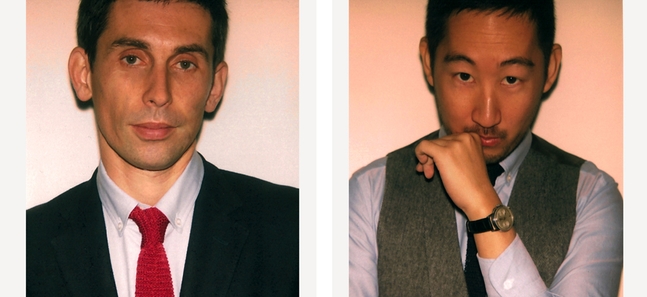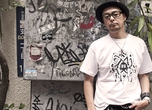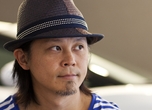
Photo by Bastien Lattanzio
Posted: Tue Aug 23 2011
'Why make a new brand?' asks Gildas Loaec, with a well-honed rhetorical flourish. 'Why make a new music label?' As one of the founders of Kitsuné, he probably asks himself those questions a lot. The French music and fashion brand has ploughed an interesting course since Gildas started it in 2002 with former architecture student Masaya Kuroki (both men prefer to go by their first names). On the music side of things, they've championed acts that straddle the divide between rock and dance, scoring hits with the likes of Simian Mobile Disco and Two Door Cinema Club. On the fashion front, they've pushed a mature image that's more likely to appeal to people who've exchanged a passion for all-night clubbing for a taste for cashmere. Confused? So were we. As Gildas heads to Tokyo to helm a jam-packed club night at Ageha, he and Masaya sat down with Time Out to explain the workings of the Kitsuné universe.
The latest Kitsuné compilation is subtitled 'The Indie-Dance Issue'. Didn't we already go through that a few years ago, with the Klaxons?
Gildas: I don't know. Wasn't it the same thing when Happy Mondays happened before?
It feels like the cycle is getting shorter and shorter.
Gildas: Maybe there is no cycle any more. Like in Japan, there are no trends: every style is always there. People dress rock on Monday, they dress hip-hop on Tuesday, and they dress preppy on Wednesday. There is no cycle.
[To Masaya] Do you feel that, as a designer?
Masaya: I think it's a question of too much media, too many magazines. In Japan, it's over-communicated how you should look when you're young and in fashion, or when you're young and in music. All the magazines that exist in Japan, it's like: Guys, you have to look like this. Girls, you have to look like this… In general, I think it's become a bit like, I don't need to have any particular job or looks or style to be part of a certain group: today I want to be hip-hop, tomorrow I want to be heavy metal. It's really non-identity, which is a little bit sad.
When you started Kitsuné, part of the inspiration was Japan, wasn't it? Do you still feel inspired by the place now?
Masaya: Yeah, it's changed. It's very fast, and at the same time very slow. The stores, for me personally, are less exciting than when we were coming eight years ago.
Gildas: The Japanese were the first to do a concept store, where in one store you had a different ambience, a different kind of product, or even having a cafe together, or a bookstore or music store… Back in the day, that was like new.
Am I right in thinking that Kitsuné is opening a store in Tokyo?
Gildas: We're working on it, for January 2012.
Have you any idea what it will look like?
Gildas: I think that will look like the best store ever made, you know? (Laughs.)
Masaya: It'll probably be not far from the big crossing of Omotesando and Aoyama-Dori, around Aoyama. That's the neighborhood we like, actually. The shopping traffic is really massive there, but there's still habitation as well. It's kind of old school, in a way.
I was wondering if you get a chance to go to any other club events when you come here. With Kitsuné, it's all about fashion and music existing within the same name, and there are people here who've brought the two worlds close together, like Yasutaka Nakata, or Verbal, or Mademoiselle Yulia…
Gildas: Yeah, we know those people, of course. But that's not what we're doing. We're not talking to the same demographic. I understand that some people can probably like some of the Kitsuné clothes that we're making, and at the same time can enjoy the compilation, but we're not making both together for people to love both together. It would have been easier for us to make something more flashy, kiddy, sporty, street or whatever to fit and work with the music label, but we wanted to be more ambitious with the clothes line, and make something with more depth than only being merchandising for the music label. I'm not saying that the people you're talking about are doing just merchandising for their music, but…
What's the benefit of doing it under the same name, then?
Masaya: I think the benefit is never today, right now, but always in the future. It's like, all the followers of the music side – which is about 15 to 20-year-old kids, or a little bit older – in four-five years, they're gonna have much more cash than when they were young, and more interest in the quality of something. So those followers can potentially be our clients too, maybe. You talk to young people, and maybe they will never come to the fashion [side], but there is a possibility as well. We don't close the door.
So which do you think has the broader demographic?
Gildas: I shouldn't say this, but people stop listening to music when they're 25 or 30 or whatever. They're less interested in what's new, what's the new cool thing. So I think it's kids from 13 to 30 who are really into the music label, and maybe the clothes is more like 25 to 50-55.
As you get older yourself, is it hard to keep up with the kids?
Gildas: Yeah, you're right. I get older, and the kids get younger. It's true: the hard part is still to be connected in a way with what's going on in the scene. It's a bit pretentious, but I do feel sometimes that we, to a certain extent, are making the scene.
Masaya: We try to stay honest with ourselves.
Gildas: As an A&R of a music label, I think what is really, really important is more the writing, and what the song is. If the song is good and makes real sense, I think whatever the style is – if it's '90s or '80s or '70s or whatever – the most important thing, at the end of the day, is that the song is good. That's what I'm looking at first.
What are your ambitions for the future? Is there any end goal?
Gildas: In Paris in the '80s, there was Agnes B. The '90s were maybe A.P.C., and then Isabel Marant and Vanessa Bruno in the 2000s. There aren't very many new brands in Paris in the 2010s apart from Kitsuné. So that's already very challenging and interesting, to be able to develop a new brand in such a competitive market. Nobody needed a new brand. Why make a new brand? Why make a new music label? Why put out an album that's already been made ten times? Is there a song that's not been sung already? We find some little challenges to make us keep going.
Do you feel like there's anything new?
Gildas: What's new? You were saying earlier that the cycle is getting shorter and shorter. I think there's no cycle any more.
[To Masaya] Do you agree?
Gildas: It depends which territory you travel in.
Masaya: You can't generalise.
Gildas: I was in Rome ten days ago. The people are stuck in the '70s. The guys are dressed like a schoolteacher from the '70s, like sunglasses and '70s clothes. You go to Australia, the guys are stuck in the '80s – they are dressed like in the '80s. And you go to Korea, they've got a weird look which is like…
Masaya: ...ten years ago in Japan.
Gildas: I'm talking too much, sorry.
Masaya: It's all right, I think he said everything.
Gildas appears at Kitsune Club Night, Ageha, August 27
Tweets
- About Us |
- Work for Time Out |
- Send us info |
- Advertising |
- Mobile edition |
- Terms & Conditions |
- Privacy policy |
- Contact Us
Copyright © 2014 Time Out Tokyo














Add your comment